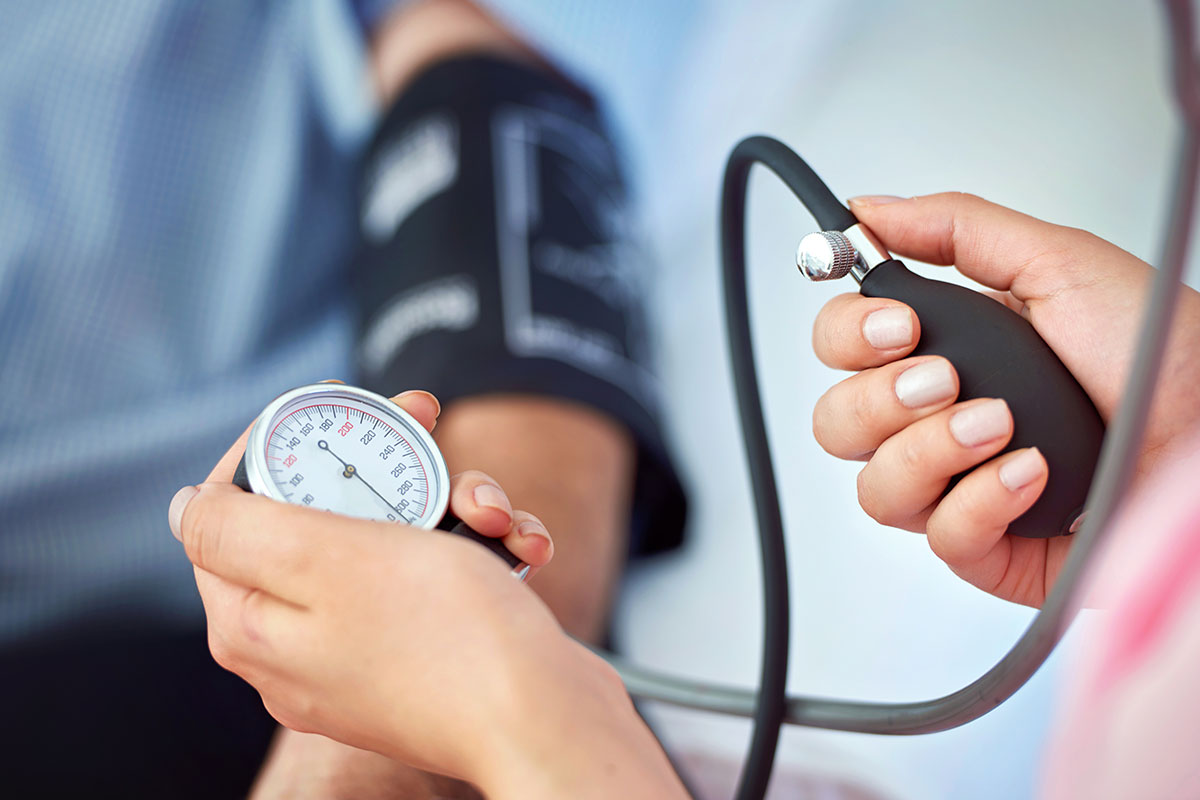What is high blood pressure?
Blood pressure is the force exerted on the vessel walls when your heart pushes blood through your arteries and veins. When your blood pressure is measured, there are two numbers that come up: diastolic and systolic. A blood pressure chart shows you whether these numbers indicate low, normal, or high blood pressure. In most patients, there are no high blood pressure symptoms and few low blood pressure symptoms.
What is considered high blood pressure?
If your blood pressure readings are regularly above 120/80, you have risk factors for developing hypertension. The blood pressure range of 120–139 and/or 80-89 is considered prehypertension; 140–159 and/or 90–99 is stage 1 hypertension; and 160–179 and/or 100–110 is stage 2 hypertension. Blood pressure numbers any higher than that may be a hypertensive crisis, and require immediate medical attention.

What are the signs of high blood pressure?
In general, high blood pressure does not have any symptoms. It can be present for a very long time before it is caught, or before a person will seek treatment. Untreated hypertension is the number-one risk factor for heart disease, which may lead to heart attack, sudden death, heart failure, strokes, or kidney failure. Regular physical checkups can diagnose hypertension early. Your FastMed care provider will typically test your blood pressure when you come in for care. In order to have your blood pressure evaluated at FastMed, the patient must complete an office visit.
What causes high blood pressure?
Many different factors often combine to cause hypertension. Some of these factors are preventable, and some are not. The non-preventable causes include genetics, race, gender, and age. For example, hypertension is twice as likely to occur in an individual who has one, or both, parents with hypertension. High blood pressure is more likely and is often more severe in African-Americans. Males are more likely than females to develop hypertension, and increased age is also a risk factor.
There are many other factors that are completely preventable. These include obesity, smoking, excessive alcohol intake, physical inactivity, and a high-salt diet. Smoking and alcohol cause the blood vessels to constrict or become smaller, causing the pressure to increase. High-salt diets cause water retention, which increases the volume of the blood that moves through the body, which increases the pressure. Obesity causes hypertension in many ways; it increases the surface area over which the blood must circulate, causing the heart to work more strenuously.
Hypotension, or low blood pressure, is also a medical condition. A blood pressure reading of less than 90/60 indicates hypotension. Though it is usually not regarded as a serious problem, it can cause dizziness, nausea, fatigue, fainting, blurred vision, and other symptoms. Chronic hypotension can also be a sign of more serious medical conditions. If you are concerned about your low blood pressure symptoms or readings, talk to your healthcare provider.
How to reduce high blood pressure
There are many blood pressure medicines available. Your healthcare provider can prescribe one that will work for you. There are many classes of blood pressure medications; while the first medication you try may cause unwanted side effects or may not be effective, there are others that may work better for you. Your healthcare provider will listen to your feedback and will work with you to find the best medication. Clearly, adopting a healthier lifestyle is also very important to high blood pressure management. Some of these lifestyle changes are harder than others, but they all will make a positive difference.
Stop smoking, limit alcohol intake
Smoking is a major contributor to high blood pressure and a number of other health conditions. Cessation should be an immediate priority when you are being treated for high blood pressure. Reducing or eliminating your alcohol intake can also help you lower blood pressure.
Diet
For patients with high blood pressure, diet adjustments are necessary. One of the best courses of action is to decrease your intake of salty and heavily processed foods. The addition of fruits, vegetables, low-fat dairy, whole grains, poultry, fish, and nuts, and the elimination of sugary foods and beverages, will make a positive impact on your blood pressure, and your overall health.
Weight loss
Along with dietary changes, weight loss is one of the best ways to manage high blood pressure. For every pound lost, there is an average decrease of about one point in your blood pressure. So, even just a five-pound weight loss can mean a huge difference in blood pressure.
Exercise
Independent from weight loss, exercise is another great tool for managing hypertension. Forty minutes of aerobic exercise three to four times per week can reduce blood pressure by up to six points. Incorporating weight training can drop it three more points.
Where can you get your blood pressure tested?
You can get a quick and accurate blood pressure test at FastMed. Our experienced healthcare professionals will perform the test and make recommendations based on the number. High blood pressure and low blood pressure are both very manageable, and early detection is key.
* The content presented on this page is not intended to diagnose health problems or take the place of professional medical care.